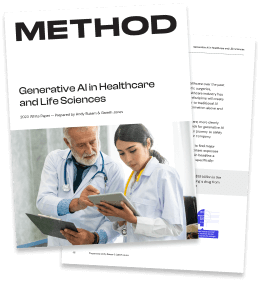Generative AI has the potential to revolutionize healthcare and life sciences. Adoption is on the rise, with applications spanning primary care, pharmaceuticals, healthcare worker support, and more. This technology has the potential to create a more precise, accessible, and personalized future in healthcare and life sciences. By embracing generative AI responsibly and ethically, we can reshape these industries for the better, ultimately improving patient care and advancing scientific discoveries.
The technology does have its challenges, including ethical concerns, data privacy, and explainability. Despite these challenges, generative AI offers significant opportunities, such as accelerated innovation, cost reduction, enhanced decision-making, personalized healthcare services, improved supply chains, fraud detection, compliance, precision marketing, and knowledge sharing. To succeed in implementing generative AI, organizations must prioritize transparency, data security, and compliance with regulations.
In this paper, we’ll share the significant history of AI in healthcare, more clearly differentiate between AI and generative AI, share industry trends for generative AI deployment, describe ways to mitigate its risks, and foster your journey to safely and effectively leverage this technology for your organization.
